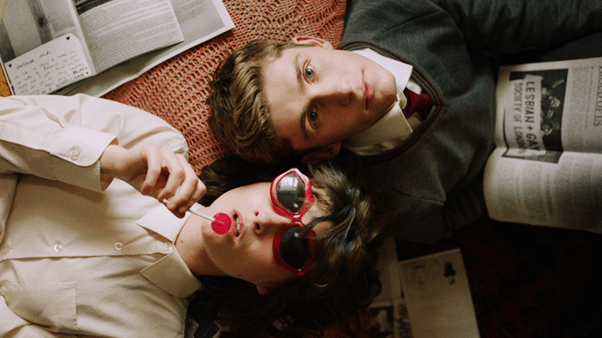Few filmmakers haven’t been hard hit by the lengthy lockdown impact of Covid-19: promotional tours called to a halt; releases delayed or shelved indefinitely; script pitches shifted to stuttering Zoom conference. But despite falling victim to all of the above, Irish writer/director David Freyne answers the phone with distinct cheer in his voice. His second feature Dating Amber, the ‘90s-set story of closeted Kildare teens Eddie and Amber who invent a romance to escape schoolyard scrutiny of their obvious otherness, has found a remarkable lease of life since debuting as an Amazon Original after its planned theatrical release became one of many new movies caught up in the pandemic fallout. Scannain spoke with Freyne about changing trends in representation, LGBT+ film financing, and creating a resonant portrait of an Irish queer experience.
So my first question is how dare you, and I’m sure I’m speaking for no end of queer Irish audiences who’ve been left in tatters by this reflection of their own comings-of-age and comings-out.
Yeah, I feel bad, every time I go on Twitter or Instagram there’s a person going “just watched Dating Amber, I’m in tears”, and it’s like… I’m sorry, I didn’t mean that. You want it to be a visceral, emotional film, I wanted it to be a laugh-out-loud and tearful film, but a hopeful film, so hopefully they’re happy tears. At the risk of being sadistic, it’s really nice to hear that people have that reaction to a film you’ve made. You know it’s working when people are crying. [Laughing]Wow, that sounds so cruel.
The appeal for me is that it’s very cathartic in how it represents that life so many kids in this country would have lived down the years, all thinking they were the only one. How did you capture that, translating your own experience but also tapping into something universal, where’s the balance in that?
For me, it’s about bringing my own experience to the screen. The best way of making anything unique is being as personal and specific as possible. I knew, of course, the experiences of coming out weren’t mine alone, I’m not the only person who had to go away to come out, I’m not the only person who found that difficult. I had confidence that in telling a unique and specific story it would connect with something more universal, there’s a universality in the experience. I tried to be as Irish and Kildare as possible with it, with the hope with that it will speak wider than that. I just had to tell the story I wanted to tell and have faith that people would respond to it. But I found really early with people reading the script, and particularly our young cast whose experiences are more recent than mine, how much it resonated with them. That really surprised me and was really heartwarming for me to hear that they responded to it in such a personal way.
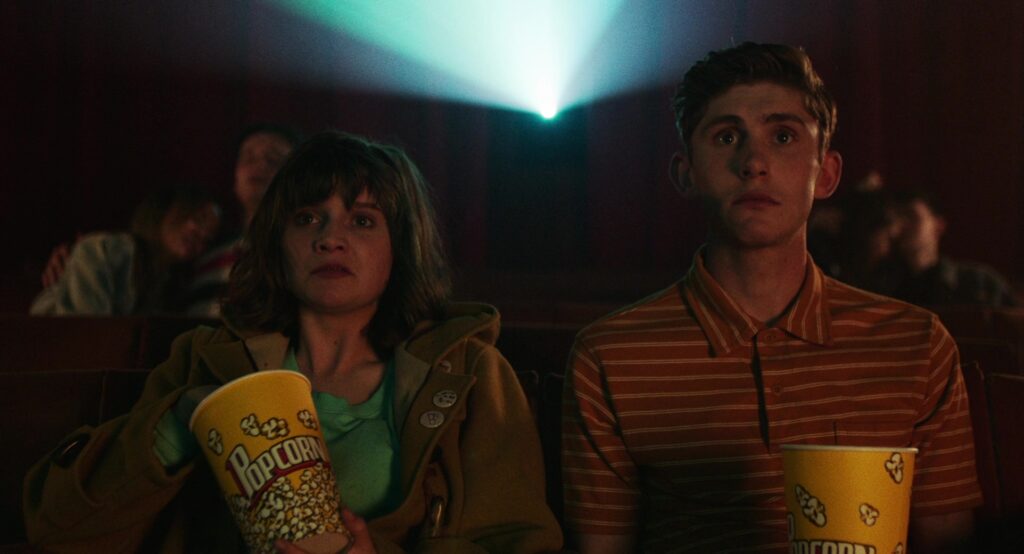
Right, cos we have a tendency—by we I mean Irish society at large but often older gays too—to assume that things are better now, that those days are past. But then we see results of BeLongTo surveys that show half of students are hearing homophobic and transphobic comments from their teachers. It’s good to see something go out there and connect with an audience in that respect.
It’s really connected with a young audience online. There is this idea that it’s so easy now to be queer, and it’s really frustrating because obviously we’ve come a long way, and nobody’s saying it isn’t easier, but we still grow up in a straight world and it’s still difficult. Homophobic bullying is on the rise and kids are still arseholes and that idea of “gay” just being a catch-all for bad is still used. I think coming out is always going to be a tricky thing for people to go through. So I think these stories are always going to be relevant. It’s the kind of thing that, particularly from older white straight male watchers who say “but sure, what’s the problem” and, y’know, well… fuck you. I think that’s something we just have to battle and be aware of the fact that as far as we’ve come there’s a lot more to do.
That gets at one of the interesting things about the tone of the film, it put me in mind of the old maxim of history first time as tragedy, second as farce. It gets at a sense of Eddie living this and being traumatised by it, but also realising how ridiculous it all is without minimising that.
From my perspective, I needed that distance to be able to look back and see that struggle with the warmth and the comedy that did exist in it. It was funny, even though it was horrible, it was really funny. We’re so used to watching these films that are tragic, not that they’re not vital but I remember when I was younger watching films like Brokeback Mountain or Philadelphia and just thinking “Well I’m going to die of AIDS or die by violence”. It was just so bleak, and I wanted to be able to see a hopeful, funny view in a film and a really lovely friendship between these two queer people. I’m so sick of films making it seem like the LGBT community live in their hermetically sealed boxes, either gay or lesbian. It’s actually really important, cos we do interact, we are friends. It was a big aim to make it broad and funny and to feel like it could be enjoyed by everybody without shying away from the queerness in any way.
Sure, and as you say that was for a long time the extent of our representation, these stories that end tragically. It does feel like there’s a movement internationally towards a kind of reclamation that I see this film fitting within, films that set themselves in the past but refuse to be tragic. I’m thinking of things like 120 BPM, Portrait of a Lady on Fire, films refuting that tragedy.
Totally! Actually, I was just doing a list for Letterboxd of my favourite queer films and I mentioned 120 BPM for that very reason, that it’s set in the ‘90s in the AIDS struggle and yet it’s so ebullient and just makes you want to dance and march on the streets. Joy and love and all these things exist within the tragedy and you have to be able to show that. I think a lot of that is also having queer people telling their own stories and framing them in a way that’s different. Just last night actually with my boyfriend I rewatched But I’m a Cheerleader.
Ohhhhh, it’s a classic.
It’s so brilliant! Out of curiosity, I went on Rotten Tomatoes to see how people reacted to it and it got slated! And mainly by people like [Guardian critic] Peter Bradshaw who said: “I want to see the darker version”. No! I think queer people want to see the fun version.
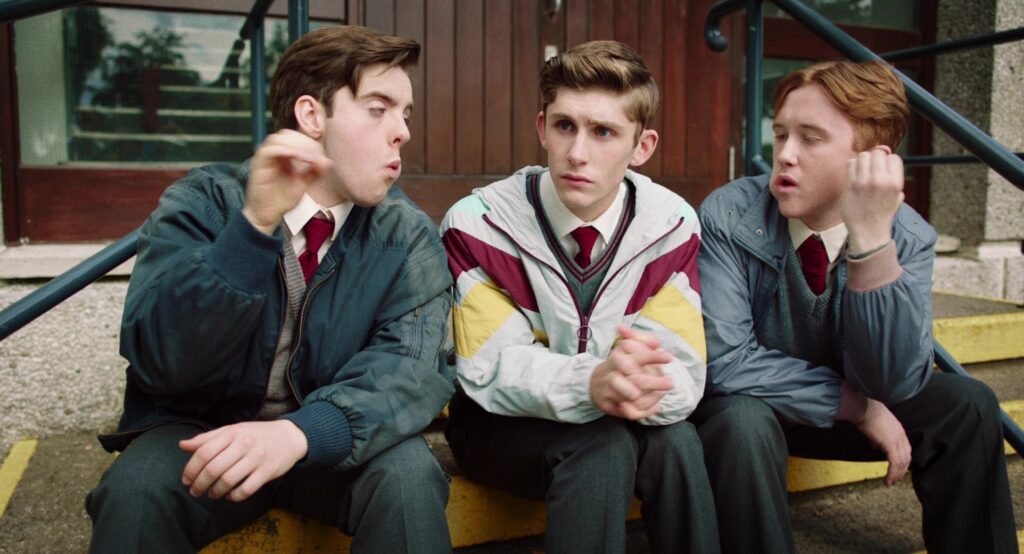
And the bizarre thing is we’re getting the darker version now, we’ve had that conversion camp story told two or three times in the last year or so. It’s fascinating to see twenty years ago we were already taking the right approach to this and it just did not land.
Exactly. And I love how embraced that film is by the queer community. Those are the films we should be making. Just funny, joyous films that aren’t shying away from the issues in any way. I think you’re right, there have been a lot: And Then We Danced is very personal but ends on an emotionally hopeful note, God’s Own Country ends on a really romantic, beautifully hopeful note, which we’ve been missing. So I think there is a mood swing, but there’s a way to go before people, financiers and studios, begin to see that. I think they still want to make their period dramas with A-list stars that are Oscar baity and that’s it. Slowly but surely we’re getting there.
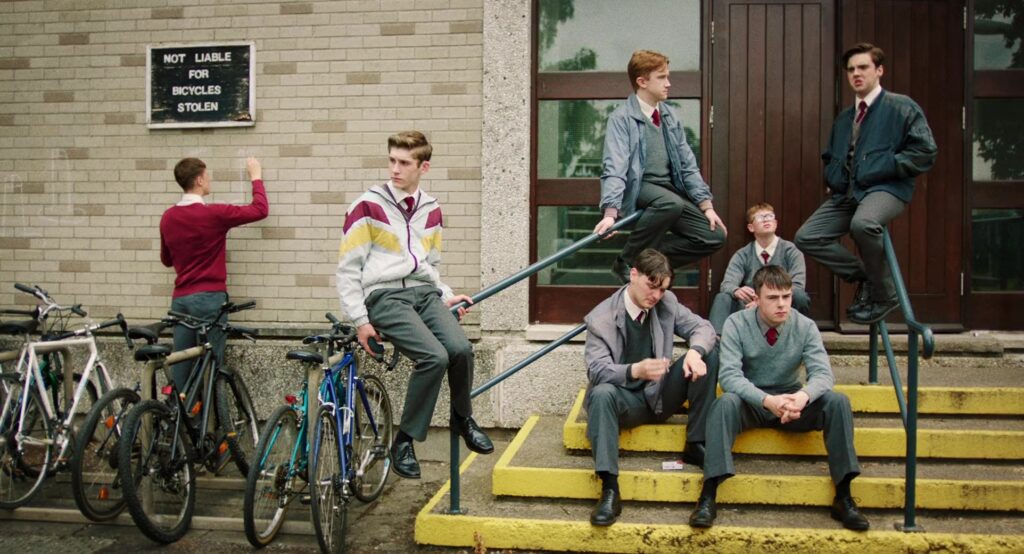
Right, we’re starting to see an appetite for this even in commercial returns. Call Me By Your Name played for half a year straight in Dublin, there’s that appetite absolutely. Did you struggle getting this made?
We were extremely lucky, it was initially rejected for financing and then we made The Cured, my producers and I. After we got that up and running we re-approached this, and having made our first film it wasn’t hard. We got finance pretty easy because we had the incredible support of Screen Ireland. They were brilliant, without them it simply wouldn’t have happened. But of course along that way you get lots of nos, and that’s fine, every film gets nos, but what really frustrated me is the reason you’re given. We were told once or twice “we already have a gay film” as if that’s a justifiable reason to say no, you can’t have two. And then we obviously got “it’s too happy and it needs to be darker”, and that really pissed me off, because the whole point of the film is it’s not dark, it’s joyous. The fact that they say those things without any self-awareness, that’s the same thing you have with any minority, whether you’re a POC or female filmmaker: “oh we already have one of those.”
“We’ve already ticked that box for this year”.
Yeah, exactly. Firstly, it shouldn’t be a box-ticking exercise, and also these things shouldn’t be seen as niche or small.
Let’s talk about [leads] Fionn [O’Shea] and Lola [Petticrew]. The film absolutely thrives on a well-developed sense of individual character and that dynamic between them. How did you go about creating that, was there a long process of rehearsal here?
All my anxiety with this film was wrapped up in the casting of Eddie and Amber. I was working with Louise Kiely who did a very wide casting net in England and Ireland. When we saw Fionn and Lola’s tapes they were really good, but it’s all down to the chemistry. So we brought it down to the last four for each role and then brought them all in all the various possible duos, and Fionn and Lola’s chemistry was amazing, I knew it was our Eddie and Amber. We started casting a year before we started, and we cast them about six months before we started shooting. I kept telling them: this film only works if you guys are best friends; if people can really buy that connection between you. I’m so lucky because they became best friends, they are best friends now: they’re in quarantine together. By the time we actually got to shoot the film, we started with two lead actors who were already living in each other’s pockets and that’s why the film works. And because we did so much rehearsal and talked about these characters so much, they had such a clear sense of their characters on a really intimate level. They were amazing. And I think they brought so much of themselves to these characters and really identified with them. Around them, we found all the other incredible actors from that wide net we cast for Amber and Eddie, great actors I wanted in the film. What I think makes the film work is that all those secondary roles, some of the funniest lines come from those, they’re so great at delivery. There was such generosity of spirit in the cast, all the actors wanted to make sure that everyone had their scene-stealing moment. I just love the casting process. It’s horrible for actors I’m sure but I really love it because you get this wealth of talent, Ireland’s brilliance laid out in front of you. It’s great for me.
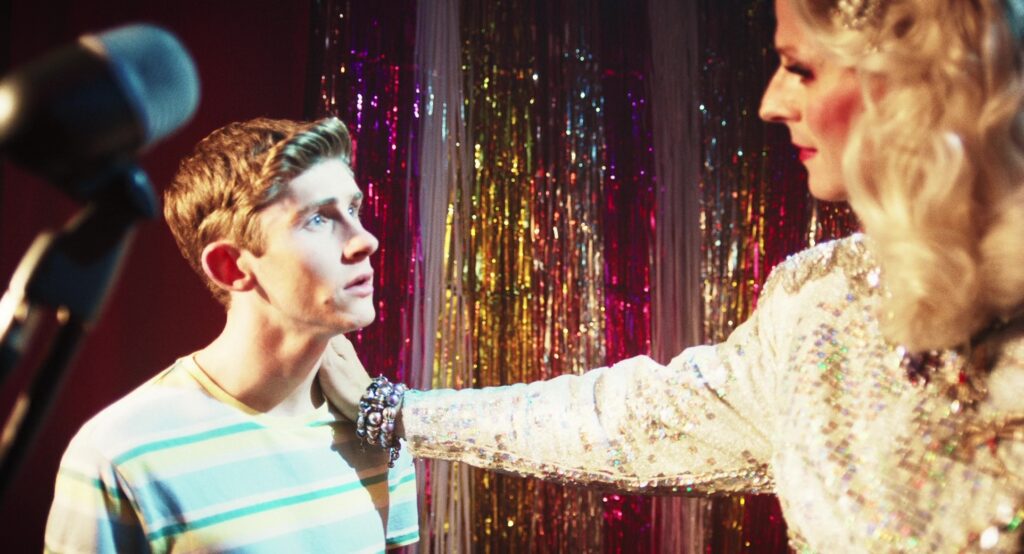
There are two scenes I want to talk about in a little detail if we can. The first is Eddie and Amber’s first trip to Dublin when they wander into the gay bar. I think probably the most elaborate shot in the movie has got to be that tracking shot of Eddie as he approaches the drag queen on stage. The camera rotates to get that shot and reaction shot all without cutting, and an almost otherworldly lighting through it all. It’s this formative moment for Eddie.
That was probably my favourite day on set and for me, in the script, that was always this big dream-like moment where he has a glimpse into what his future could be with the fairy gay mother figure in Jonny Woo the drag queen. We shot it in Whelan’s and my production designer Emma Lowney did an amazing job setting it. Then myself and Ruairí O’Brien my incredible DP worked it out, how we’d flow through and make it feel dream-like. We mapped it out, figured out how we could do this in one shot without breaking it, and still introduce Sarah and Amber. Addo Gallagher the gaffer did an amazing job with the lighting. Ruairí is a brilliant handheld operator, that’s all handheld, not even Steadicam. He kept it really nice and fluid. What we always kept saying was this has to be like a dream, this has to feel like a less creepy David Lynch scene. I feel like it’s the first gay bar experience every gay kid wants to have.
Right, it has this great sense of epiphany and possibility about it.
And I love how loving and caring Jonny Woo is, there’s nothing predatory, it’s this really sweet scene. And it introduces Sarah, the future girlfriend for Amber. That was a minute and a half unbroken and then we break to go back to Amber for a funny line about him usually being straighter than that, I couldn’t lose that line. But there was a version where it goes on for another thirty seconds and we then leave the stage and go back to the girls all in one shot. In the edit myself and Joe Sawyer my editor played around to see what’s the maximum time we can get out of this shot before we got bored, and when do we want to go back to Lola. In the first test screening, we actually had that two-minute unbroken shot and it was testing patience a little bit but I couldn’t lose the scene. There was a bit of tension with that scene, some people didn’t like it, so to cut back to that joke saved it. We really fought for that scene, I love it so much. Ruairí outdid himself with that sequence.
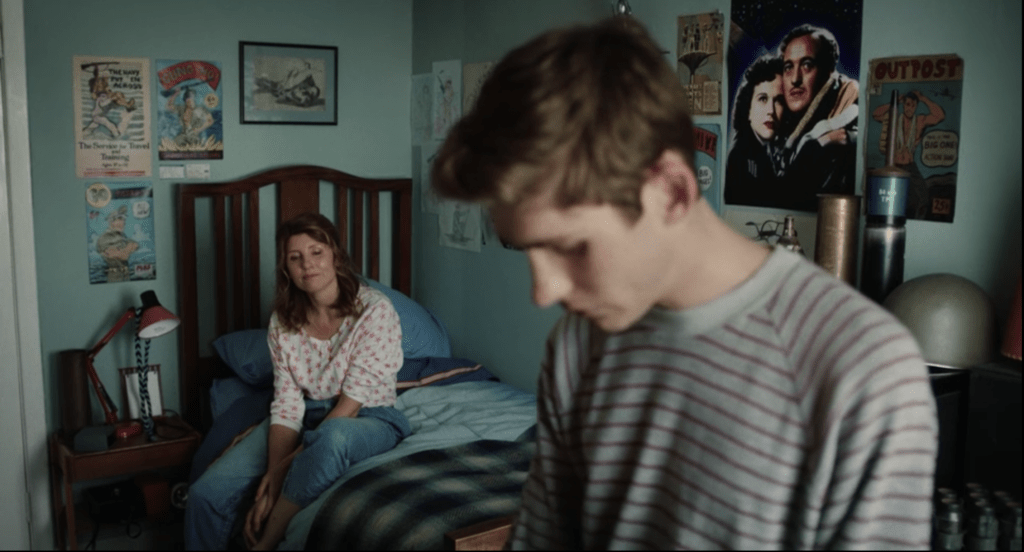
The other sequence I want to talk about is what might easily have been called your Call Me By Your Name moment, with the great Sharon Horgan making a clear overture to Eddie to come out to her in his room… and nothing. I found that really recognisably touching and painful all at once.
We’ve gotten so many messages from mums that that’s really resonated with them. Sharon did such a beautiful job with that scene, she’s amazing. That’s a very personal scene, I think it’s something a lot of gay kids have. There’s that really tricky thing for parents where they suspect or know their kid is gay but you can’t force them out, there’s probably nothing more damaging than that. It was something I really identified with, I’ve had those kinds of scenes in my life. I wanted to make sure I didn’t demonise those parents, they’re just doing their best and trying their hardest and you know they love their kid even if they don’t always do the right thing. I love that scene, both the performances are stunning and heartbreaking. It’s subtly performed in many ways, it’s not this big teary scene. It’s all down to Sharon and Fionn. It’s a scene I was nervous about because it was very personal, I wanted it to be something that resonated with people, I wanted parents and kids to be able to see themselves in that scene.
It’s a very strange time I’m sure to be debuting a movie. I suppose on the one hand by releasing online you’ve got the ability to go out to a wider audience and make those connections you’re talking about in scenes like that, and with kids from the kind of communities the film is set in that might not have had access to this in a cinema had it opened. But I’m sure there’s probably a certain regret that it didn’t get the cinema release too?
It’s complicated. We were so happy when Amazon took it on as a Prime Original. It was a solution in this Covid time, but I think we’ve had a wider audience than we ever would have had in a traditional landscape or going to a festival first. I think just because there’s been such an appetite for something heartwarming it’s gone quite wide and feels like it’s become a sleeper hit in a way, which is lovely. It’s been really nice, you feel like you’re not going to be connected to an audience but in a way, I’ve had more love for this online and via social media than I’ve ever had with anything I’ve done. But of course, I grew up of an age where I’m very nostalgic for the cinema, and I want that experience. Hopefully later on in the year, via Wildcard in Ireland, we’ll be able to do the cinema run. I mainly just want to see it with people and see the reactions, when you know the jokes are landing it’s such an exhilarating feeling. But I’m really happy, I think it’s worked out so well for us. What’s really amazing is that you have to fight so much with financiers and distributors, saying I promise this film if you give it a chance will be a wide crowd-pleasing film, and what we managed to show with the Prime release is that it is, and in a different time maybe Prime wouldn’t have taken it and maybe we wouldn’t have had the opportunity to prove that. I think very often what stops queer film reaching an audience is distributors not having faith, and now we can prove that this is a broadly appealing film, with fan art and music videos and all these things that have come from it. I think for me, looking on the bright side, it’s worked out really well, and I’m conscious so many films have been really badly affected by Covid, have lost cinematic releases and haven’t had the opportunity to go with a streamer. So I can only feel grateful for the opportunity we’ve been given.
Dating Amber is available to stream now in Ireland and the UK on Amazon Prime.

